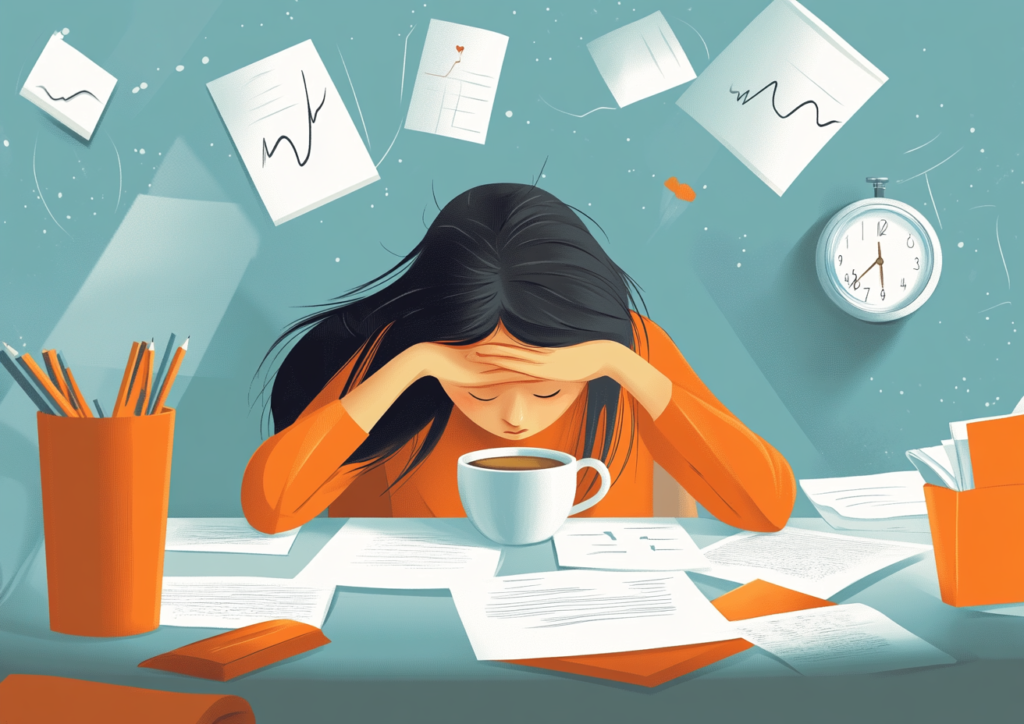Caffeine is a ubiquitous part of modern life. From the morning coffee ritual to the afternoon energy drink, it’s woven into the fabric of our daily routines. While caffeine enthusiasts swear by its energy-boosting properties, its impact on anxiety and mental health is becoming increasingly scrutinized.
In recent years, research has started to reveal the complex relationship between caffeine and mental health. Though caffeine can provide a significant energy lift, it can also have adverse effects on our well-being. Many people, even experts, and starting to think it might be a more prominent issue than we thought.
Let’s dive into why caffeine is bad for anxiety and how it might contribute to declining mental health. Additionally, we will discuss the potential benefits of switching to decaf and making mindful choices to improve overall well-being. Whether you’re a committed coffee lover or just considering alternatives, Decaf Nation is about helping you prioritize your mental health while still enjoying the comforting ritual of coffee.
Physiological Effects of Caffeine on Anxiety
Elevated Heart Rate and Blood Pressure
One of the most immediate effects of caffeine is an elevated heart rate. When caffeine stimulates the central nervous system, it leads to an increase in heart rate and blood pressure. This can be particularly alarming for those with anxiety, as the physical sensation of a racing heart can mimic an impending panic attack.
James Hoffmann explains that this response triggers the body’s fight-or-flight mechanism, interpreting the increased heart rate as a sign of danger. For individuals with anxiety, this heightened state can lead to further distress and panic.
Simulation of Anxiety Symptoms
Caffeine’s stimulating effects can lead to physical symptoms that closely resemble those of anxiety. These include:
- Jitteriness: The sensation of nervous energy and trembling from caffeine consumption can be mistaken for anxiety symptoms.
- Sweating: Increased perspiration is another common response to caffeine, often misinterpreted as anxiety-induced sweating.
These symptoms can create a feedback loop, causing individuals to become more anxious about the sensations they are experiencing. Understanding and recognizing these symptoms as caffeine-related rather than anxiety-related is crucial for effective anxiety management.
Long-Term Stress
Chronic caffeine consumption can lead to long-term stress. The body’s persistent state of alertness depletes energy reserves and leads to an increase in cortisol, the stress hormone. Elevated cortisol levels are associated with various health issues, including chronic anxiety and depression.
While caffeine may provide temporary relief from fatigue, its long-term effects on stress levels can be detrimental. Hoffmann suggests mindful consumption of caffeine and considering alternatives, such as decaf, to mitigate these effects.
Understanding these physiological effects is essential for individuals looking to manage their anxiety more effectively. Recognizing that caffeine can exacerbate anxiety symptoms can help in making informed and mindful choices about caffeine consumption.
Sleep Disruption

Caffeine consumption, particularly later in the day, can lead to significant sleep disruption. For individuals with anxiety, maintaining a consistent and restful sleep schedule is crucial to managing symptoms. However, caffeine’s presence in the system can interfere with both the quantity and quality of sleep, exacerbating anxiety.
Delay in Sleep Onset
One of the primary ways caffeine affects sleep is by delaying sleep onset. Caffeine blocks adenosine receptors in the brain, preventing the build-up of this sleep-promoting chemical. As a result, falling asleep becomes more challenging, leading to prolonged periods of wakefulness.
James Hoffmann emphasizes the importance of recognizing caffeine’s long half-life, which can linger in the system and affect sleep even if consumed hours earlier in the day. For those with anxiety, this delay in sleep onset can create additional stress and anxiety around bedtime.
Reduced Sleep Quality
Caffeine not only makes it harder to fall asleep but also reduces the overall quality of sleep. Research suggests that caffeine consumption can disrupt the normal sleep cycle, particularly affecting the deeper stages of sleep critical for physical and mental restoration.
Hoffmann notes that the light, fragmented sleep resulting from caffeine intake can leave individuals feeling less rested and more fatigued the next day. This fatigue can compound anxiety symptoms, making it difficult to cope with daily stressors.
Creation of a Vicious Cycle
The combination of delayed sleep onset and reduced sleep quality can lead to a vicious cycle for those with anxiety. Persistent fatigue resulting from poor sleep can prompt individuals to consume more caffeine throughout the day to stay alert. This increased caffeine intake further disrupts sleep the following night, perpetuating a cycle of sleep deprivation and heightened anxiety.
James Hoffmann advises establishing a caffeine cut-off time early in the afternoon to avoid its impact on sleep. Monitoring and adjusting caffeine consumption can be a critical step in breaking this cycle and improving overall sleep quality.
Understanding the connection between caffeine and sleep disruption is essential for managing anxiety effectively. By making mindful choices about caffeine consumption, individuals can create a more stable foundation for restful sleep, ultimately aiding in the management of anxiety symptoms.
Physical Symptoms
Caffeine’s stimulating properties often lead to various physical symptoms that can closely mimic or exacerbate anxiety. Recognizing these symptoms and understanding their link to caffeine consumption is crucial for anyone managing anxiety.
Shaky Hands
One of the most common physical manifestations of caffeine consumption is shaky hands. This occurs because caffeine stimulates the central nervous system, increasing neuromuscular activity. For individuals with anxiety, this tremor can be particularly distressing.
- Explanation: As caffeine floods the system, it heightens the excitability of nerves, causing muscles to twitch and hands to shake.
- Impact: This symptom can be mistaken for an anxiety-driven tremor, further heightening anxiety levels as individuals become concerned about their physical state.
Sweating
Another common physical symptom caused by caffeine is increased sweating. Caffeine stimulates the adrenal glands, leading to the production of adrenaline, which in turn increases perspiration. Excessive sweating, especially in social situations, can be a source of embarrassment and stress for those with anxiety.
- Explanation: The stimulant effect of caffeine causes the body to enter a fight-or-flight mode, elevating body temperature and triggering sweat glands.
- Impact: Sweating can make individuals feel self-conscious, possibly exacerbating social anxiety and overall stress.
Understanding the Feedback Loop
These physical symptoms can create a feedback loop that exacerbates anxiety. For example, noticing one’s shaky hands or increased sweating may lead to further anxiety and stress, which in turn can heighten these physical symptoms.
Recognizing these symptoms as caffeine-induced rather than purely anxiety-related is essential for breaking this loop. Mindful consumption of caffeine, along with techniques to manage anxiety, can help individuals better handle these physical manifestations.
Steps to Mitigate Physical Symptoms
- Mindful Consumption: Being aware of the amounts and timing of caffeine consumption can help reduce its physical effects.
- Hydration: Drinking plenty of water can help mitigate some of the dehydration effects of caffeine, thereby reducing sweating.
- Relaxation Techniques: Strategies such as deep breathing, progressive muscle relaxation, and mindfulness can help counteract the physical symptoms of caffeine-induced anxiety.
Stress Hormones

Caffeine has a significant impact on the body’s production of stress hormones, particularly cortisol. Understanding how caffeine influences these hormones can help in managing both stress and anxiety more effectively.
Increased Cortisol Levels
Caffeine stimulates the production of cortisol, the body’s primary stress hormone. Cortisol is essential for various bodily functions, including metabolism and immune response, but elevated levels can be detrimental, especially for those with anxiety.
- How it works: Caffeine activates the hypothalamic-pituitary-adrenal (HPA) axis, leading to increased cortisol release. This is the body’s natural response to a perceived threat, intended to prepare for fight-or-flight.
- Impact: Regular caffeine consumption leads to chronically elevated cortisol levels, which can contribute to ongoing feelings of stress and anxiety.
Effects of Elevated Cortisol
Elevated cortisol levels have several adverse effects on the body and mind, particularly for individuals who are already prone to anxiety.
Weight Gain
Chronic stress and high cortisol levels can lead to weight gain, particularly around the abdomen. This can create a feedback loop, where increased weight and body image concerns further contribute to anxiety and stress.
Suppressed Immune Function
Elevated cortisol can suppress the immune system, making the body more susceptible to infections and illnesses. For someone with anxiety, frequently getting sick can add another layer of stress and worry.
Cognitive Impairment
High cortisol levels are linked to impaired cognitive function, including problems with memory and concentration. This can make it difficult to focus on tasks or process information, exacerbating feelings of inadequacy and anxiety.
Breaking the Cycle
Recognizing the link between caffeine and elevated cortisol levels is crucial for breaking the cycle of stress and anxiety.
- Mindful Consumption: Limiting caffeine intake, especially during stressful periods, can help manage cortisol levels.
- Stress-Relief Practices: Incorporating practices like meditation, deep breathing, and regular exercise can help reduce cortisol levels naturally.
- Dietary Adjustments: Foods rich in antioxidants and omega-3 fatty acids can help counteract the effects of elevated cortisol.
While caffeine can provide a temporary energy boost, its impact on cortisol production must be considered. Mindful consumption and awareness of its effects can help manage stress and anxiety more effectively.
By understanding how caffeine affects stress hormones, we can make better choices to mitigate its impact on anxiety. Reducing or moderating caffeine intake, coupled with stress-relief practices, can lead to a more balanced and less stressful life.
Broader Impacts on Mental Health
Mood Swings

Caffeine can significantly influence your mood, causing fluctuations that may impact overall mental well-being. Understanding how caffeine contributes to mood swings is crucial for managing mental health effectively.
Initial Energy Boost
Caffeine provides an immediate energy boost by stimulating the central nervous system. This surge of alertness and heightened mood can be beneficial in the short term, giving you the energy needed to tackle tasks or improve focus.
- How it works: Caffeine blocks adenosine receptors, preventing the calming effects of adenosine and leading to increased dopamine and norepinephrine levels. This results in a burst of energy and an elevated mood.
- Impact: While this can be positive initially, its temporary nature can lead to a sharp contrast once the effects wear off.
The Crash
As the effects of caffeine wear off, the body experiences a drop in energy levels. This can leave you feeling tired, irritable, and less motivated. The contrast between the high and subsequent low can be jarring, especially for individuals already dealing with mood disorders.
- Explanation: Once the caffeine is metabolized, adenosine rushes back into its receptors, leading to a sudden onset of fatigue and decreased alertness.
- Impact: This sudden crash can exacerbate feelings of depression and mood swings, creating a rollercoaster of emotions that can be challenging to manage.
Emotional Volatility
The cycle of energy boosts followed by crashes makes it difficult to maintain a stable mood. This emotional volatility can be particularly disruptive for those with mental health conditions such as anxiety or depression.
- Explanation: The fluctuation in neurotransmitter levels due to caffeine can lead to rapid changes in mood, from feeling energetic and positive to fatigued and low.
- Impact: This can lead to frustration, irritability, and a sense of instability, making it harder to cope with everyday stressors.
Managing Mood Swings
Understanding and recognizing how caffeine affects your mood can help you take steps to manage these fluctuations more effectively.
- Moderation: Limiting caffeine intake can help reduce the intensity of mood swings. Gradually decreasing consumption can help mitigate the withdrawal effects.
- Balanced Diet: Consuming a balanced diet rich in nutrients can help stabilize energy levels and mood. Foods high in vitamins, minerals, and healthy fats can support mental well-being.
- Mindfulness Practices: Incorporating mindfulness practices such as meditation, yoga, or deep breathing can help you stay grounded and manage emotional volatility.
